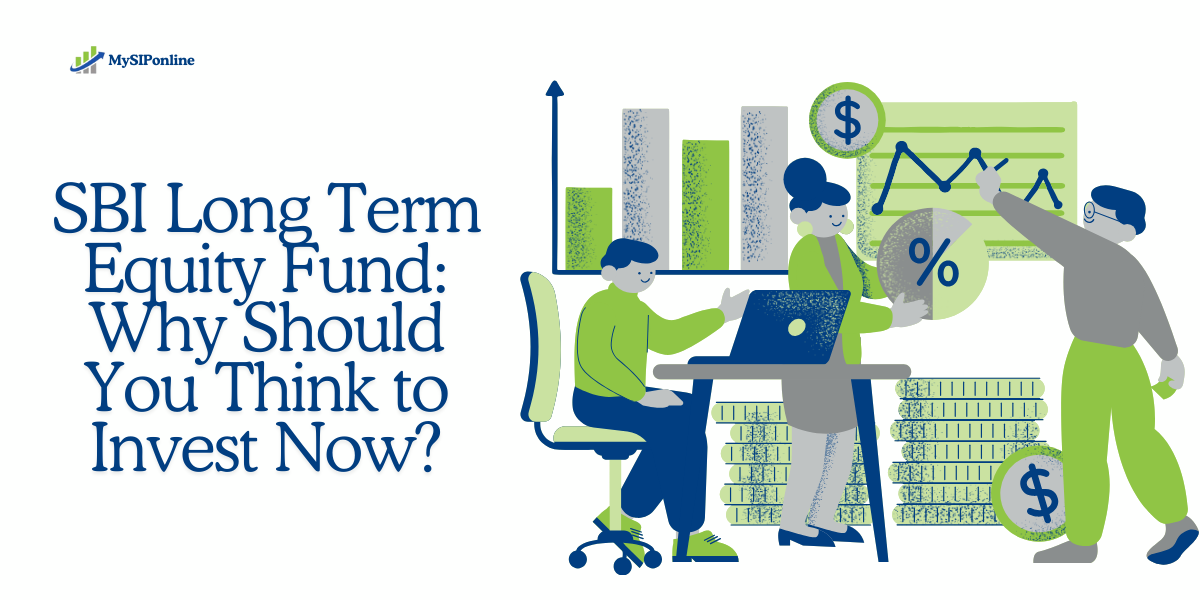Overview of SBI Long Term Equity Fund
The SBI Long Term Equity Fund is an Equity Linked Savings Scheme (ELSS) that provides investors with tax benefits as well as the chance to build wealth. With an emphasis on long-term capital appreciation, this fund has been a popular choice among investors trying to maximize their portfolios.
After being launched on 31st March 1993, the AUM (asset under management) held by it is Rs.25.731 Crores as of 30.06.24. Since then it has delivered 12.73% returns with good consistency.
This detailed guide explores the fund’s objectives, strategy, performance, and suitability for different investor profiles.
SBI Long Term Equity Fund: Objectives and Strategy
Here are the key features that this energy mutual fund apart from its peers:
1. Investment Objective
- The primary objective of the SBI Long Term Equity Scheme is to achieve capital appreciation.
- This objective is focused on generating long-term growth in the value of the fund’s investments.
2. Primary Investments
- The fund invests primarily in stocks, cumulative convertible preference shares, and convertible debentures.
- This diversified portfolio of equity-linked instruments allows the fund to participate in the growth potential of the equity markets.
3. Long-Term Investment Horizon
- The fund is designed for investors who are prepared to participate in the fund for at least three years.
- This long-term investment horizon aligns with the fund’s objective of capitalizing on the equity market’s long-term development potential.
4. Capitalizing on Equity Market Growth
- The fund aims to leverage the long-term growth potential of the equity markets to generate capital appreciation for its investors.
- By investing primarily in stocks and equity-linked instruments, the fund seeks to capture the upside potential of the equity markets over the long term.
5. Tax Benefits under Section 80C
- The SBI Long Term Equity Fundprovides tax benefits to investors under Section 80C of the Income Tax Act.
- This tax benefit can enhance the overall returns for investors and make the fund an attractive investment option for those seeking to optimize their tax liability.
6. Investor Suitability
- The fund is suitable for investors who are willing to commit to a long-term investment horizon of at least three years.
- This suitability is based on the fund’s objective of capitalizing on the long-term development potential of the equity markets.
7. Risk and Return Profile
- As an equity-focused fund, the SBI Long Term Equity MF carries a higher risk profile compared to fixed-income or low-risk investment options.
- However, the fund’s focus on long-term capital appreciation also offers the potential for higher returns over the investment horizon.
Overall, the SBI Long Term Equity Mutual Fund is designed to provide investors with exposure to the long-term growth potential of the equity markets, while also offering tax benefits under Section 80C of the Income Tax Act.
What are the Key Features of the SBI Long Term Equity Fund?
The following points highlight the vital aspects of this stock:
1. Tax Benefits: Investments in this fund qualify for tax deductions up to ₹1.5 lakh per financial year under Section 80C. This makes it an attractive option for tax-saving investments.
2. Lock-in Period: The fund has a mandatory lock-in period of three years, which encourages disciplined investing and helps investors ride out market volatility.
3. Diversified Portfolio: The fund invests in a diversified range of stocks, reducing the risk associated with individual stock investments.
How Does the Performance Analysis of SBI Long Term Equity Fund Look?
1. Historical Returns
The SBI Long-Term Equity Fund has shown robust performance since its inception. As of July 2024, the fund has delivered an annualized return of approximately 17.12% since its launch in May 2007. Over the past year, the fund has outperformed many of its peers, achieving a return of about 58.82% compared to the category average of 38.71% for the same period.
2. Comparison with Peers
The fund consistently ranks among the top in its category for one-year and three-year returns, showcasing strong management and investment strategy. Its expense ratio of 1.63% is slightly below the category average, making it a cost-effective choice for investors.
How the Market Conditions Favors SBI Long Term Equity Fund?
The following points show how this stock behaves during market downturns:
1. Economic Growth
India’s economy is on a growth trajectory, supported by government initiatives aimed at boosting manufacturing and infrastructure development. This environment is conducive to equity investments, particularly in sectors that are likely to benefit from economic reforms and increased consumer spending.
2. Inflation and Fixed Income Returns
With inflation rates fluctuating, traditional fixed-income investments may not yield satisfactory returns. In contrast, equities have historically provided returns that outpace inflation, making the SBI Long-Term Equity Fund an attractive option for long-term wealth creation.
3. Long-Term Investment Horizon
Investors are increasingly recognizing the importance of long-term investment strategies. With a suggested investment horizon of over three years, the SBI Long Term Equity Mutual Fund aligns well with this approach, allowing investors to benefit from market growth over time while minimizing short-term volatility risks.
Is SBI Long Term Equity Fund Suitable for Your Portfolio?
The selection of the right is the most important part of creating long-term wealth. Here are some points to note as an investor.
The SBI Long-Term Equity Fund is suitable for 2024:
1. Tax-Conscious Investors: Those looking to save on taxes while investing for the long term.
2. Growth-Oriented Investors: Individuals seeking capital appreciation through equity investments.
3. Risk-Tolerant Investors: Investors who can withstand market fluctuations and are looking for higher returns over a longer time frame.
Considerations Before Investing in SBI Long Term Equity Fund
While the SBI Long Term Equity Fund presents a compelling investment opportunity, potential investors should consider:
- Investment Horizon
Ensure that your investment timeline aligns with the fund’s minimum lock-in period of three years.
- Market Volatility
Be prepared for market fluctuations, as equity investments can be volatile in the short term.
- Financial Goals
Assess how this fund fits into your overall financial strategy and goals.
Conclusion
Investing in the SBI Long Term Equity Mutual Fund now could be a strategic move for those looking to combine tax savings with the potential for significant capital appreciation. Invest via a SIP plan to give a boost to your overall portfolio.
With its strong historical performance, alignment with economic growth trends, and favourable investment structure, this fund stands out as a viable option for long-term investors. However, it is essential to evaluate your financial situation and investment objectives before making any decisions.
Also Read
- ► IELTS Exam Date & Essential Needs: Know with Noida Coaching
- ► What Is The Right Path To Enter The United States To Study?
- ► Top Features to Look in Payroll Software Systems for 2025
- ► Sacred Destinations: Umrah Taxi Service in Makkah
- ► BOT Model Secrets: How Businesses Build and Thrive Effortlessly
- ► Why Day Crawler TN9000 is a Must-Have for Vapers?
- ► Online Cricket ID: Betting Guide & Platform Comparisons
- ► закупка ссылочной массы для продвижения сайта
- ► Why Do Fashion Brands Need a Whatsapp Business API Provider in 2025?
- ► How Branded Watches for Men Can Enhance Your Style?
- ► Internal Audit vs External Audit: Key Differences for NBFCs
- ► How to Choose Between MSME and NSIC Registration for Your Business?
- ► Motilal Oswal Small Cap Mutual Fund: Invest in Your Future Now
- ► Unveil the Latest Kerwin Frost Clothing Collection
- ► Online Ceramics The Streetwear Revolution Redefining Urban Fashion





